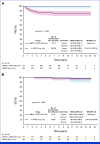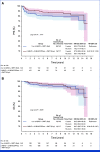Long-Term Follow-Up of the Response-Adapted Intergroup EORTC/LYSA/FIL H10 Trial for Localized Hodgkin Lymphoma
- PMID: 37967311
- PMCID: PMC10730029
- DOI: 10.1200/JCO.23.01745
Long-Term Follow-Up of the Response-Adapted Intergroup EORTC/LYSA/FIL H10 Trial for Localized Hodgkin Lymphoma
Abstract
Clinical trials frequently include multiple end points that mature at different times. The initial report, typically based on the primary end point, may be published when key planned co-primary or secondary analyses are not yet available. Clinical Trial Updates provide an opportunity to disseminate additional results from studies, published in JCO or elsewhere, for which the primary end point has already been reported.The primary analysis of the Early positron emission tomography (ePET) Response-Adapted Treatment in localized Hodgkin Lymphoma H10 Trial demonstrated that in ePET-negative patients, the risk of relapse increased when involved-node radiotherapy (INRT) was omitted and that in ePET-positive patients, switching from doxorubicin, bleomycin, vinblastine, and dacarbazine (ABVD) to bleomycin, etoposide, doxorubicin, cyclophosphamide, vincristine, procarbazine, and prednisone (BEACOPPesc) significantly improved 5-year progression-free survival (PFS). Here, we report the final results of a preplanned analysis at a 10-year follow-up. In the favorable (F) ePET-negative group, the 10-year PFS rates were 98.8% versus 85.4% (hazard ratio [HR], 13.2; 95% CI, 3.1 to 55.8; P value for noninferiority = .9735; difference test P < .0001) in favor of ABVD + INRT; in the unfavorable (U) ePET-negative group, the 10-year PFS rates were 91.4% and 86.5% (HR, 1.52; 95% CI, 0.84 to 2.75; P value for noninferiority = .8577; difference test P = .1628). In ePET-positive patients, the difference in terms of PFS between standard ABVD and intensified BEACOPPesc was no longer statistically significant (HR, 0.67; 95% CI, 0.37 to 1.20; P = .1777). In conclusion, the present long-term analysis confirms that in ePET-negative patients, the omission of INRT is associated with lower 10-year PFS. Instead, in ePET-positive patients, no significant difference between standard and experimental arms emerged although intensification with BEACOPPesc was safe, with no increase in late adverse events, namely, second malignancies.
Conflict of interest statement
The following represents disclosure information provided by authors of this manuscript. All relationships are considered compensated unless otherwise noted. Relationships are self-held unless noted. I = Immediate Family Member, Inst = My Institution. Relationships may not relate to the subject matter of this manuscript. For more information about ASCO's conflict of interest policy, please refer to
Open Payments is a public database containing information reported by companies about payments made to US-licensed physicians (
No other potential conflicts of interest were reported.
Figures



References
-
- Radford J, Illidge T, Counsell N, et al. : Results of a trial of PET-directed therapy for early-stage Hodgkin's lymphoma. N Engl J Med 372:1598-1607, 2015 - PubMed
-
- Fuchs M, Goergen H, Kobe C, et al. : Positron emission tomography-guided treatment in early-stage favorable Hodgkin lymphoma: Final results of the International, randomized phase III HD16 trial by the German Hodgkin Study Group. J Clin Oncol 37:2835-2845, 2019 - PubMed
-
- Borchmann P, Plütschow A, Kobe C, et al. : PET-guided omission of radiotherapy in early-stage unfavourable Hodgkin lymphoma (GHSG HD17): A multicentre, open-label, randomised, phase 3 trial. Lancet Oncol 22:223-234, 2021 - PubMed
-
- Raemaekers J, André M, Federico M, et al. : Omitting radiotherapy in early positron emission tomography-negative stage I/II Hodgkin lymphoma is associated with an increased risk of early relapse: Clinical results of the preplanned interim analysis of the randomized EORTC/LYSA/FIL H10 trial. J Clin Oncol 32:1188-1194, 2014 - PubMed
-
- André M, Girinsky T, Federico M, et al. : Early positron emission tomography response–adapted treatment in stage I and II Hodgkin lymphoma: Final results of the randomized EORTC/LYSA/FIL H10 trial. J Clin Oncol 35:1786-1798, 2017 - PubMed

